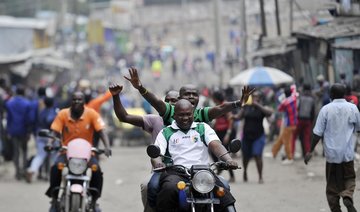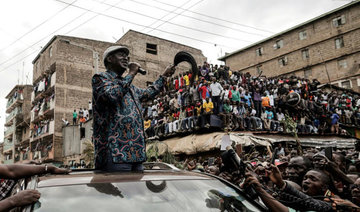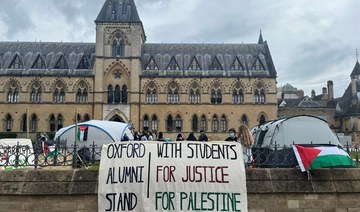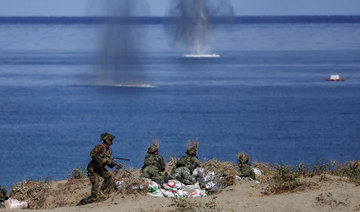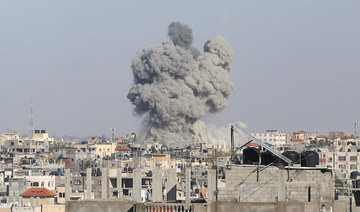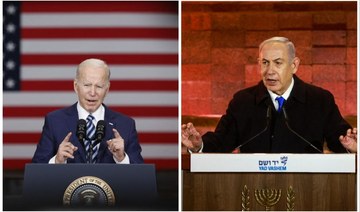NAIROBI: Opposition leaders across Africa, long frustrated in their campaigns to topple firmly entrenched leaders, are hailing the shock overturn of last month’s presidential vote in Kenya, calling it an example for their own countries to emulate.
“If it happened in Kenya, it can happen in Zimbabwe as well,” Zimbabwe’s opposition leader Morgan Tsvangirai told thousands of supporters at a rally on Saturday.
Tsvangirai, the leader of the Movement for Democratic Change (MDC), has made three failed attempts at the Zimbabwean presidency, losing all of them to President Robert Mugabe, who has kept an iron grip on the country since 1980.
Elections in Zimbabwe have been marred by violence, intimidation and charges of electoral fraud.
“This is an unprecedented decision in the whole of Africa and I think it’s a good step toward democracy,” Tsvangirai said.
On Friday, Kenya’s Supreme Court canceled the results of the Aug. 8 election, which kept President Uhuru Kenyatta in office, over widespread irregularities. The country now has until Oct. 31 to hold a new election.
“Kenyan judges have just given an extraordinary lesson to Africa and to the world,” said Burundi’s opposition leader Charles Nditije.
Burundi has been in the grip of a political crisis since April 2015, when President Pierre Nkurunziza announced his intention to run for a third term.
He won elections that July that were boycotted by the opposition, who branded the vote a violation of the constitution.
Nditije, who heads main opposition group CNARED, said the Kenya decision stands in stark contrast to the “cowardice” shown by Burundi’s Constitutional Court, which cleared Nkurunziza’s re-election bid.
Kenya’s Supreme Court is “a model of independence for the judiciary to follow,” Nditije said.
The Burundian government, for its part, qualified the Kenya decision as a “lesson” for those who criticized the country’s Constitutional Court for allowing Nkurunziza to run for a third term.
In Uganda, ruled since 1986 by President Yoweri Museveni, the main opposition leader Kizza Besigye applauded the Kenya decision.
“This is unprecedented in Africa,” Besigye told AFP.
Besigye faced arrest before, during and after the February 2016 presidential election, coming second to Museveni in the controversial vote.
Museveni, who has ruled the east African nation for 31 years, won in the first round with more than 60 percent of the votes, but foreign monitors said the election was held in an atmosphere of intimidation.
Besigye said Museveni’s victory came through cheating and fraud.
“The Ugandan judiciary should learn from their counterparts in Kenya, to be independent,” Besigye said. “I doubt if the same would have taken place in Uganda.”
In Gabon, the office of opposition leader Jean Ping said in a statement that the Kenya decision was “normal.”
“The Kenyan case is simply normal, while Gabon is not,” Ping’s spokesman Jean-Gaspard Ntoutoume Ayi said.
Ping, a 74-year-old career diplomat, was narrowly defeated by incumbent Ali Bongo in presidential elections last August.
Gabon’s Constitutional Court ruled that Bongo won 50.66 percent of the vote and Ping 47.24 percent, leading the opposition leader to accuse the administration of electoral fraud.
The court rejected Ping’s bid for a recount, upholding Bongo’s victory, obtained by a winning margin of around 11,000 votes.
For the Bongo government, the Kenyan ruling “is proof that it is the country’s institutions that determine the electoral process and not international observers.”
“If a Supreme Court goes through the effort of canceling rigged elections, I think that electoral commissions charged with organizing elections will now pay more attention to the risk of seeming to be sanctioned by a higher institution,” former Guinean prime minister Cellou Dalein Diallo said.
Diallo has accused President Alpha Conde of electoral fraud and said he had “stolen” two presidential elections held in 2010 and 2015.
Diallo hopes the Kenya ruling will inspire other courts charged with treating electoral disputes in Africa.
In Tanzania, opposition lawmaker Zitto Kabwe called for amending the constitution: “Kenya has set the bar higher. Tanzania needs a new constitution” so there is a way to challenge an election before a court.
And in Rwanda — where President Paul Kagame was re-elected for a third term last month with nearly 99 percent of the vote — opposition leader Frank Habineza said the Kenya ruling was “very encouraging for the opposition in Africa.”
“The independence of the justice system is important on this continent, and it helps to avoid other destructive choices such as setting up armed rebel groups and violent demonstrations,” he said.
Africa’s opposition leaders take heart in Kenya election ruling
Africa’s opposition leaders take heart in Kenya election ruling
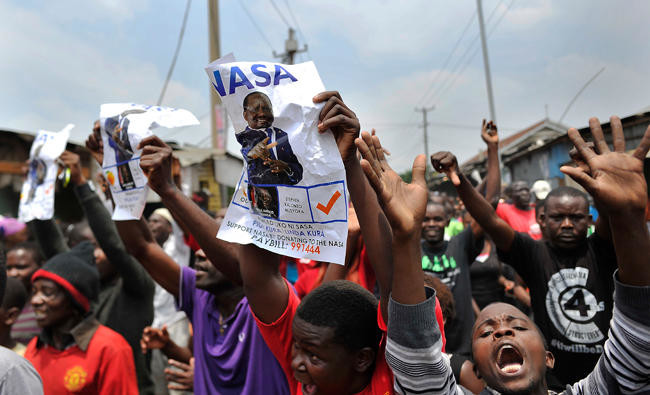
Russia says it takes control of two more settlements in eastern Ukraine
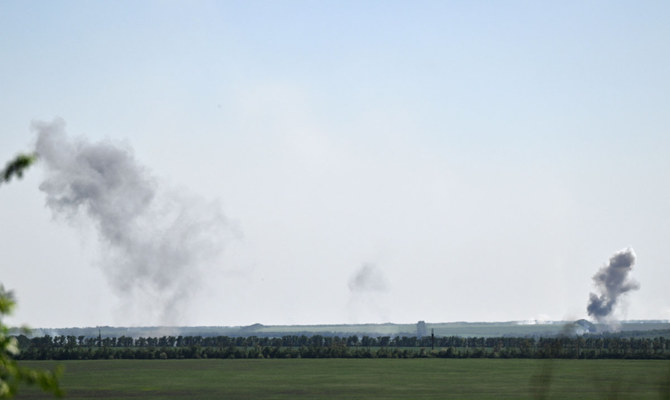
- Russia has made slow but steady advances since taking Avdiivka in February, with a string of villages in the area falling to Moscow’s forces
MOSCOW: Russian forces have taken control of the settlements of Soloviove in Ukraine’s eastern Donetsk region and Kotliarivka further north in the Kharkiv region, the defense ministry said on Monday.
Ukraine’s military made no mention of either locality in its evening General Staff report. Kharkiv Regional Governor Oleh Syniehubov said on Monday that Kotliarivka, located near the town of Kupiansk, was one of several locations to come under Russian shelling.
But Ukrainian bloggers appeared to acknowledge that both villages were in Russian hands.
DeepState, a popular forum on the war, noted on Saturday that Kotliarivka had been captured by Russian forces and on Sunday said the neighboring village of Kyslivka was also in Russian hands.
DeepState reported that Soloviove, northwest of the Russian-held town of Avdiivka, had been taken by Russian forces last week.
Russia has made slow but steady advances since taking Avdiivka in February, with a string of villages in the area falling to Moscow’s forces.
UNICEF warns 600,000 children face ‘catastrophe’ in Rafah
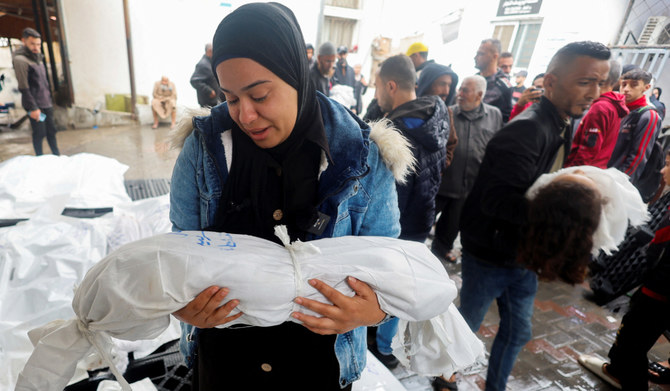
- Calling again for a ceasefire and safe access for humanitarian organizations, the agency highlighted there are some 78,000 infants under age two sheltering in the city, along with 175,000 children under five who are affected by infectious disease
- Israel has killed more than 34,000 Palestinians in Gaza, mostly women and children, according to the health ministry in the Hamas-run territory
NEW YORK: Some 600,000 children packed into Gaza’s Rafah city face “further catastrophe,” UNICEF warned on Monday, urging against their forced relocation after Israel ordered an evacuation ahead of its long-threatened ground invasion.
“Given the high concentration of children in Rafah ... UNICEF is warning of a further catastrophe for children, with military operations resulting in very high civilian casualties and the few remaining basic services and infrastructure they need to survive being totally destroyed,” the UN children’s agency said in a statement.
It said Gaza’s youth were already “on the edge of survival,” with many in Rafah — where the agency said the population has soared to 1.2 million people, half of them children — already displaced multiple times and with nowhere else to go.
“More than 200 days of war have taken an unimaginable toll on the lives of children,” said UNICEF Executive Director Catherine Russell.
“Rafah is now a city of children, who have nowhere safe to go in Gaza,” she said, warning that a large-scale military operation by Israel would bring “chaos and panic, and at a time where (children’s) physical and mental states are already weakened.”
UNICEF estimates that Rafah’s population has swelled to nearly five times its normal figure of 250,000 residents.
Calling again for a ceasefire and safe access for humanitarian organizations, the agency highlighted there are some 78,000 infants under age two sheltering in the city, along with 175,000 children under five who are affected by infectious disease.
Gaza’s bloodiest-ever war began following Hamas’s unprecedented Oct. 7 attack on Israel.
Israel has conducted a retaliatory offensive that has killed at least 34,735 people in Gaza, according to the Hamas-run
territory’s Health Ministry.
Of that toll, more than 14,000 are children, the ministry has said.
Israeli Prime Minister Benjamin Netanyahu has vowed to send ground troops into Rafah regardless of any truce, despite concerns from the US, other countries, and aid groups.
Hamas official Izzat Al-Rashiq said in a statement that any Israeli operation in Rafah would put the truce talks in jeopardy.
Senior Hamas official Sami Abu Zuhri said the evacuation order was a “dangerous escalation” that would have consequences.
“The US administration, alongside the occupation, bears responsibility for this terrorism,” the official said.
Hamas said later in a statement that any offensive in Rafah would not be a “picnic” for Israeli forces and said it was fully prepared to defend Palestinians there.
Aid agencies have warned that the evacuation order will lead to an even worse humanitarian disaster in the crowded coastal enclave of 2.3 million people reeling from seven months of war.
“Forcing 1 million displaced Palestinians from Rafah to evacuate without a safe destination is not only unlawful but would lead to catastrophic consequences,” British charity ActionAid said.
Nick Maynard, a British surgeon trying to leave Gaza on Monday, said in a voice message from the Gaza side of the Rafah crossing into Egypt: “Two huge bombs have just gone off immediately outside the crossing. There’s a lot of gunfire as well about 100 meters from us. We are very unclear whether we will get out.”
“Driving through Rafah, the tension was palpable with people evacuating as rapidly as they could.”
Witnesses said the areas in and around Rafah where Israel wants to move people are already crowded with little room for more tents.
“The biggest genocide, the biggest catastrophe, will take place in Rafah. I call on the whole Arab world to interfere for a ceasefire — let them interfere and save us from what we are in,” said Aminah Adwan, a displaced Palestinian.
Israel has been threatening to launch incursions in Rafah, which it says harbors thousands of Hamas fighters and potentially dozens of hostages.
Victory is impossible without taking Rafah, it says.
New York’s Columbia University cancels graduation ceremony as students remain defiant

- Pro-Palestinian protests put paid to event planned for May 15
NEW YORK: New York’s prestigious Columbia University has announced that it is canceling its main graduation ceremony, scheduled for next week, because of ongoing pro-Palestinian protests.
The announcement on Monday is the latest development in a movement that began nearly three weeks ago at Columbia and has swept college campuses nationwide.
The graduation ceremony had been scheduled for May 15 on the south lawn of the Manhattan campus, where protest encampments had been based before authorities dismantled them last week.
The Ivy League institution said it would “forego the university-wide ceremony” and hold a series of smaller events instead.
“We are determined to give our students the celebration they deserve, and that they want,” Columbia announced, saying “smaller-scale, school-based celebrations are most meaningful to them and their families.”
The university added: “We will focus our resources on those school ceremonies and on keeping them safe, respectful, and running smoothly. A great deal of effort is already underway to reach that goal.”
Students across the US have protested and set up tents at dozens of universities to register their opposition to the war in Gaza, while calling on President Joe Biden to do more to stop the bloodshed.
They have also demanded their institutions cease supporting companies that support Israel’s government.
Maya James, a psychology student at Columbia, told Arab News: “Seeing the university’s really insane response to student protests has brought so many people together, because I feel like most people on this campus can agree, including faculty, that students should not be penalized for expressing their First Amendment rights to protest, to petition, to do all of these things we’ve been encouraged to do for so long.”
She called on the university to give amnesty to students who had been suspended for expressing their First Amendment rights, which protect freedom of speech, the press, assembly, and the right to petition.
James also called on the university to disclose its investments because as “of right now there’s no visibility for us students to be able to know what the university is expected to do.”
She described the “vibes” at the protest sites as “absolutely remarkable,” with cultural and educational programs being offered and all kinds of activities being held.
She said the demonstrations were a continuation of Columbia’s long tradition of protest which began in the 1960s with its opposition to the involvement of the US in the Vietnam War.
James said it was “incredible” to see the solidarity for the Palestinian cause spread in campuses across the US, and people pushing to ensure “that we do indeed see a free Palestine within our lifetime and that our universities are no longer complicit in the genocide.”
Demonstrators have gathered on at least 40 US university campuses since April 17, often erecting tent camps to protest against the soaring death toll in the Gaza Strip. Nearly 2,000 people have been detained, according to the US media.
Police officers have forcibly ended several student sit-ins in recent days, including one at New York University at the request of its administrators.
Demonstrators had barricaded themselves inside Columbia, the epicenter of student protests in New York, and some complained about police brutality when officers cleared the faculty.
(With Agencies)
Taiwan must invest in building its own ‘strengths,’ vice president-elect says
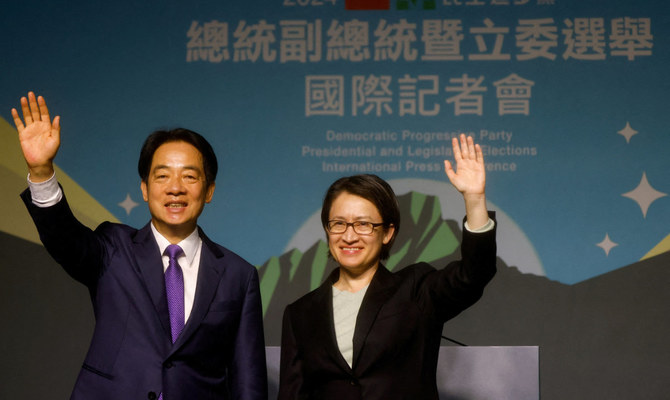
- The United States is Chinese-claimed Taiwan’s most important supporter and arms supplier, despite the lack of diplomatic ties
TAIPEI: Taiwan is grateful for continued US security assistance but must invest in building its own “strengths” first and show the world its support for the island is worth it, Vice President-elect Hsiao Bi-khim said on Monday.
Hsiao, who takes office with President-elect Lai Ching-te on May 20, is Taiwan’s former de facto ambassador to Washington, and is expected to play a key role in further strengthening ties with the United States given her fluent English and deep ties in the US capital.
The United States is Chinese-claimed Taiwan’s most important supporter and arms supplier, despite the lack of diplomatic ties.
Speaking to a think-tank forum, Hsiao expressed appreciation for US President Joe Biden last month signing into law legislation to boost Taiwan’s defenses, part of a broader package of assistance for Ukraine and Israel.
“This bill demonstrates the US’ continuing commitment to supporting allies and partners in the face of geopolitical challenges,” she said.
“But beyond thanking our international friends for their support, it is important that as Taiwanese we invest in building our own strengths first,” she said.
“Through our own efforts in building a resilient Taiwan, we must have the confidence that Taiwan is worthy of galvanizing international support.”
China has ramped up its military pressure against Taiwan over the past four years. Taiwan’s government rejects Beijing’s sovereignty claims.
Hsiao and Lai — who have pledged to continue President Tsai Ing-wen’s defense self-sufficiency and modernization program — take power just months before the US presidential election in November.
Former President Donald Trump, whose administration strongly supported Taiwan and is the presumptive Republican candidate this time round, has said US allies like European members of NATO have to spend more on defense and not just rely on the United States shouldering the burden.
Trump has also been critical of US support for Ukraine following its invasion by Russia.
Rafah invasion ‘must not go ahead’: UK Labour leader
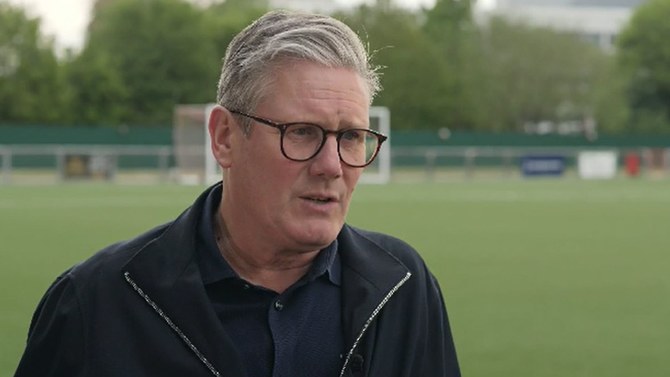
- Keir Starmer calls for ‘immediate ceasefire, release of hostages, unimpeded aid into Gaza’
- Israeli defense minister warns of ‘powerful operation in very near future’
LONDON: An Israeli offensive in the Gazan city of Rafah “must not go ahead,” the leader of the UK’s main opposition Labour Party said on Monday.
Keir Starmer’s comments came after the Israeli military told Palestinian civilians in the area to leave ahead of a planned offensive.
“With more than a million Palestinian civilians sheltering in Rafah, an Israeli offensive must not go ahead,” Starmer wrote on X.
“There must be an immediate ceasefire, the immediate release of all hostages, and unimpeded aid into Gaza that can be delivered regularly, quickly and safely.”
Israeli Defense Minister Yoav Gallant warned on Sunday of “a powerful operation in the very near future in Rafah.”
Starmer was echoed by his Shadow Foreign Secretary David Lammy, who posted on X that an invasion of Rafah “would be catastrophic.”
Shadow International Development Secretary Lisa Nandy warned that people trapped in Rafah “have nowhere else to go.”
So far, at least 34,700 Palestinians have been killed in Gaza since the start of the war last October.



